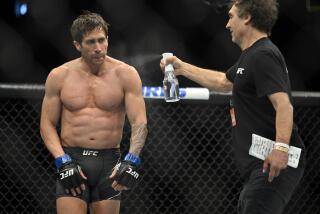Op-Ed: Lohan, Noriega video game lawsuits are a troubling sign for the arts
Former Panamanian strongman Manuel Noriega and actress Lindsay Lohan have at least one thing in common: Both recently filed high-profile lawsuits against video game makers, charging that their likenesses were used in games without their permission.
These suits may seem like acts of desperation by people now more notorious than famous, and a judge has already ruled against Noriega. But they are nevertheless extremely worrying.
Lohan and Noriega are part of an increasing trend of celebrities asking the courts to censor speech about them. And if any of these suits is successful, the implications are not limited to video games. Filmmakers, writers, artists, even musicians will all have to worry about how they use famous people in their creative work.
The basis of these claims is something called “the right of publicity.” Perhaps most often asserted here in the celebrity epicenter of California, the right protects individuals against the unauthorized use of their likenesses for commercial purposes. The aim is to ensure that unscrupulous purveyors of goods can’t just Photoshop a celebrity into an advertisement, for example, without getting approval (and a licensing deal) first.
Lohan contends that the wildly popular game “Grand Theft Auto V” did exactly that, appropriating her likeness in creating the character Lacey Jonas. Lohan’s lawyers argue that the game “incorporated her image, likeness, clothing [and] outfits … in the form of hats, hair style, sunglasses, jean shorts.” The complaint notes that “the game also features Hotel Chateau Marmont in West Hollywood, a place where [Lohan] once lived and often frequents.” Lohan is asking the judge to order the game’s maker, Rockstar Games, to remove the images and pay her damages.
The character does vaguely resemble Lohan — but she also looks and acts like thousands of other young women in Southern California. Rockstar denies that it imitated Lohan’s voice or likeness.
Noriega’s suit against “Call of Duty: Black Ops II” is similar, though with a twist: Activision, the game’s maker, has admitted to using Noriega’s image. But it maintained that it has the right to include Noriega, who was convicted in federal court of money laundering and drug trafficking, in a game with a narco-terrorism story line. Noriega’s appearance in the “Call of Duty” game, Activision argued, is speech protected by the 1st Amendment. On Tuesday, a California judge agreed and dismissed the case. It was a welcome ruling, but it is subject to appeal.
These should be easy cases. Lohan doesn’t have the right to ban pretty, curvy young women from video games. Nor should Noriega be permitted to censor depictions of his notorious criminality. The problem is that the law does not follow common sense. Prior rulings have given both Lohan and Noriega reason to believe they might ultimately succeed.
In 2009, the band No Doubt sued Activision over the use of its members as characters in the game “Band Hero.” In that case, a deal between the game maker and the musicians was already in place; the suit turned on whether the depictions went beyond what the band had agreed to. Though the case was eventually settled out of court, it added weight to the idea that the right of publicity can be used by individuals to police their depictions in works of art.
And in 2013, the U.S. 9th Circuit Court of Appeals held that NCAA athletes could sue game maker Electronic Arts for their depictions in various sports games. The 1st Amendment provided no bar to the suit, said the court. The parties settled, with the firm eventually paying $40 million to the players.
As these cases suggest, courts have been quite receptive to the idea that the right of publicity can be wielded by celebrities against the makers of creative works.
Yet while nearly all these cases involve video games, there is no legal reason that this principle is limited to games. Indeed, in the case involving the athletes, a federal appeals court emphasized that “video games are entitled to the full protection of the 1st Amendment.”
But if games are no different from films or books, what stops anyone depicted in a ripped-from-the-headlines movie, or a hard-hitting unauthorized biography, from suing the creators?
Consider 2010’s “The Social Network.” The film about the creation of Facebook won three Oscars. Yet it was not without critics — most notably Mark Zuckerberg himself, who said the film was full of inaccuracies. Could Zuckerberg sue the producers and distributors of the film for violating his rights of publicity? For that matter, could Tom Cruise sue Andrew Morton, the author of “Tom Cruise: An Unauthorized Biography”?
Part of the problem is that so many cases to date have involved video games. And judges, who — to put it politely — are typically advanced in years, appear to have little understanding of the cultural and even artistic importance of games, or the ways in which they comment on social issues. Judges tend to see games as products that exploit celebrity likenesses — not as art forms worthy of protection by the 1st Amendment.
To be sure, the right of publicity exists for a reason: Likenesses can be misused, and individuals ought to have some way to stop others from trading on their image for gain. But that right must be properly balanced with respect for freedom of expression.
Lawsuits such as Lohan’s and Noriega’s make one thing clear: The right of publicity has metastasized into a threat to artistic freedom. The Constitution’s framers rightly put the 1st Amendment first, in the belief that free expression was the paramount right of a free people. While rights of publicity have a legitimate narrow application, courts must take a skeptical approach to broad assertions of these rights that limit legitimate commentary and storytelling.
Kal Raustiala and Christopher Sprigman are law professors at UCLA and New York University, respectively, and the authors of “The Knockoff Economy: How Imitation Sparks Innovation.”Follow the Opinion section on Twitter @latimesopinion
More to Read
A cure for the common opinion
Get thought-provoking perspectives with our weekly newsletter.
You may occasionally receive promotional content from the Los Angeles Times.





